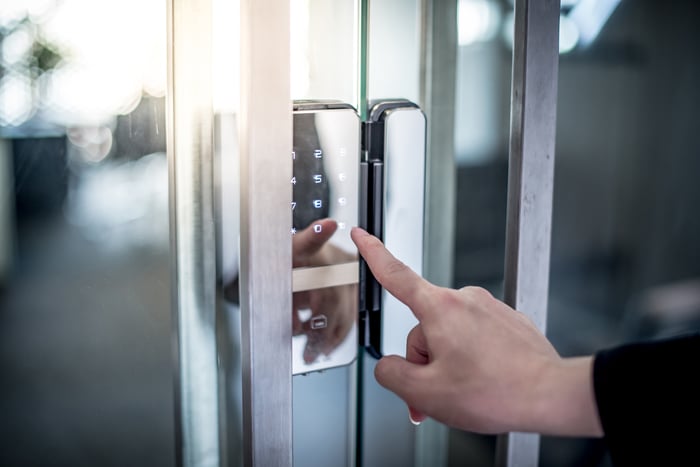Just to be clear upfront: Any company that loses 68% of its value (or more) comes with inherent risks, so investors should be cautious. But the broader tech market sell-off since November 2021 has been brutal to many high-growth stocks, and some now present an attractive risk-reward proposition.
Two stocks in particular are changing the face of their respective industries through innovation. It's an ambitious undertaking, and success is rarely without bumps in the road. But if they can turn around the sentiment regarding the true value of their stock, they could supercharge your portfolio over the long term.

Image source: Getty Images.
1. Latch: Down 68%
The security industry for new buildings probably isn't the first place you'd look for a transformative tech stock. But Latch (LTCH 15.66%) is delivering innovative solutions that are changing the way high-rise builders think about guest management and access. Latch has become so popular, in fact, that 3 out of every 10 new apartments in the U.S. feature its security products.
The company's Smart Access technology allows users to unlock their doors using the Latch App, a key code, or even their Apple Watch. It offers multiple hardware configurations to serve new construction or to retrofit existing buildings. And the Latch Intercom allows new-age guest and delivery management, giving the users power to grant access to a visitor or a courier even if they're not home.
But unlike many security providers, which install systems and then move on, Latch is also a software-as-a-service company. Once its Intercom and Smart Home systems are implemented, it charges each landlord a subscription fee, creating a recurring revenue stream. As of the recent third quarter of 2021, it had booked $59.8 million of annual recurring revenue, a growing portion of its expected $360 million in total bookings for 2021.
Buildings take time to complete, and since Latch often makes deals with builders before projects begin construction, it reports bookings that are expected to eventually convert into revenue when finished. Once Latch officially reports its fourth-quarter 2021 results, the company expects it will have generated up to $42 million in revenue for the full year. In 2022, analysts expect that figure to soar 252% to $148 million, the natural result of a bookings backlog that is quickly being realized.
Latch is not a profitable company just yet, but its revenue growth over the next few years could pave the way to positive earnings per share. Its stock has traded in the public markets for less than a year, and while it offers promise, investors should make this bet a long-term one.

Image source: Getty Images.
2. Lemonade: Down 84%
Artificial intelligence (AI) is allowing companies to rapidly deliver products and solutions that used to require hours of human input. In this case, Lemonade (LMND 0.83%) is leveraging the advanced technology to sell insurance. It offers five different types including car insurance, a segment it only recently entered.
Lemonade's goal is to make the customer experience more pleasant, and its AI-powered bot, Maya, does this by delivering a quote in less than 90 seconds. There's no need for frustrating, lengthy phone calls or clunky online questionnaires. Filing a claim is quick, too, with processing times as short as three minutes. This is particularly appealing to younger buyers, with the majority of Lemonade's customers being under age 34.
When Lemonade developed its homeowners, renters, pet, and life insurance, its strategy was to allow its AI model to learn over time. The more data it ingests, the more accurate it becomes, and therefore reaching optimal performance can be a slow process. When it pivoted to car insurance, which is its largest market yet, it decided to bolt on an acquisition to speed up the process.
In November 2021, Lemonade acquired Metromile (MILE), which also uses AI for insurance purposes. At the time, Metromile had collected over 3 billion miles' worth of data and had a decade-long head start over Lemonade in car insurance. Additionally, Metromile brought its 49 state licenses to the deal, which is incredibly valuable to Lemonade as a new entrant to the market.
Lemonade already has 1.36 million customers, but car insurance could transform its business by helping it snatch market share from much larger industry players. In 2020, the company generated $94 million in revenue, but in 2022 analysts expect that figure to soar to $219 million. That's a 132% increase in just two years or a 52% compound annual growth rate.
And it could get even better. The U.S. car insurance market is estimated to be worth $316 billion in 2022, so while Lemonade's stock is down 84% from its all-time high of $182, it has an enormous addressable market to grow into. That makes it an exciting long-term bet for investors who are open to some risk.





